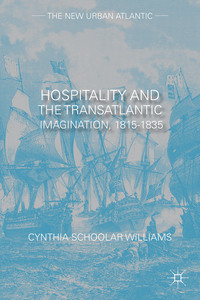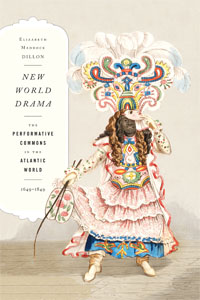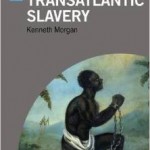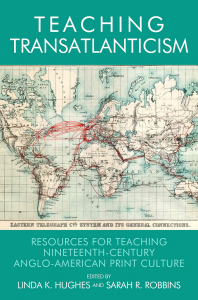For a preview of the forthcoming Teaching Transatlanticism, please click here to read the Introductory chapter: “Tracing Currents and Joining Conversations.”
New Book: Hospitality and the Transatlantic Imagination, 1815-1835, by Cynthia Schoolar Williams
 From Palgrave MacMillan: “At the exhausted conclusion of the Napoleonic Wars, as nationalisms gained momentum, writers as diverse as Mary Shelley, James Fenimore Cooper, Washington Irving, and Felicia Hemans took up the discourse of hospitality. In a series of innovative transatlantic texts, they posed urgent questions about displacement and the nation: How does one claim to belong? What are the limits of welcome?Hospitality and the Transatlantic Imagination, 1815-1835 argues that this select group of late-Romantic English and American writers disrupted national tropes by reclaiming their countries’ shared historical identification with hospitality. In doing so, they reimagined the spaces of encounter: the city, the young republic, the coast of England, and the Atlantic itself.”
From Palgrave MacMillan: “At the exhausted conclusion of the Napoleonic Wars, as nationalisms gained momentum, writers as diverse as Mary Shelley, James Fenimore Cooper, Washington Irving, and Felicia Hemans took up the discourse of hospitality. In a series of innovative transatlantic texts, they posed urgent questions about displacement and the nation: How does one claim to belong? What are the limits of welcome?Hospitality and the Transatlantic Imagination, 1815-1835 argues that this select group of late-Romantic English and American writers disrupted national tropes by reclaiming their countries’ shared historical identification with hospitality. In doing so, they reimagined the spaces of encounter: the city, the young republic, the coast of England, and the Atlantic itself.”
New Book: New World Drama: The Performative Commons in the Atlantic World, 1649-1849 by Elizabeth Maddock Dillon
 From Duke University Press: “In New World Drama, Elizabeth Maddock Dillon turns to the riotous scene of theatre in the eighteenth-century Atlantic world to explore the creation of new publics. Moving from England to the Caribbean to the early United States, she traces the theatrical emergence of a collective body in the colonized New World—one that included indigenous peoples, diasporic Africans, and diasporic Europeans. In the raucous space of the theatre, the contradictions of colonialism loomed large. Foremost among these was the central paradox of modernity: the coexistence of a massive slave economy and a nascent politics of freedom.
From Duke University Press: “In New World Drama, Elizabeth Maddock Dillon turns to the riotous scene of theatre in the eighteenth-century Atlantic world to explore the creation of new publics. Moving from England to the Caribbean to the early United States, she traces the theatrical emergence of a collective body in the colonized New World—one that included indigenous peoples, diasporic Africans, and diasporic Europeans. In the raucous space of the theatre, the contradictions of colonialism loomed large. Foremost among these was the central paradox of modernity: the coexistence of a massive slave economy and a nascent politics of freedom.
Audiences in London eagerly watched the royal slave, Oroonoko, tortured on stage, while audiences in Charleston and Kingston were forbidden from watching the same scene. Audiences in Kingston and New York City exuberantly participated in the slaying of Richard III on stage, enacting the rise of the “people,” and Native American leaders were enjoined to watch actors in blackface “jump Jim Crow.” Dillon argues that the theater served as a “performative commons,” staging debates over representation in a political world based on popular sovereignty. Her book is a capacious account of performance, aesthetics, and modernity in the eighteenth-century Atlantic world.”
New Book: Emily Dickinson’s Rich Conversation by Richard E. Brantley

From The publisher, “Emily Dickinson’s Rich Conversation explores the function of hope in Dickinson’s poems and looks to place her in a broad cultural context. Brantley teases out the implications of a succinct central perception by treating that perception as a pebble tossed into the pool of late-19th-century transatlantic culture. His departure from familiar stylistics and his challenging yet entertaining mode of analysis make for delightful reading.” – Paul Crumbley, Professor of English and Director of the Undergraduate American Studies Program, Utah State University, USA
News: Book cover design for forthcoming edition of Teaching Transatlanticism released!
New Book: Literature and Music in the Atlantic World, 1767-1867 by Catherine Jones
 From Amazon.com: “This new study looks at the relationship of rhetoric and music in the era’s intellectual discourses, texts and performance cultures principally in Europe and North America. Catherine Jones begins by examining the attitudes to music and its performance by leading figures of the American Enlightenment and Revolution, notably Benjamin Franklin and Thomas Jefferson. She also looks at the attempts of Francis Hopkinson, William Billings and others to harness the Orphean power of music so that it should become a progressive force in the creation of a new society. She argues that the association of rhetoric and music that reaches back to classical Antiquity acquired new relevance and underwent new theorisation and practical application in the American Enlightenment in light of revolutionary Atlantic conditions. Jones goes on to consider changes in the relationship of rhetoric and music in the nationalising milieu of the nineteenth century; the connections of literature, music and music theory to changing models of subjectivity; and Romantic appropriations of Enlightenment visions of the public ethical function of music.”
From Amazon.com: “This new study looks at the relationship of rhetoric and music in the era’s intellectual discourses, texts and performance cultures principally in Europe and North America. Catherine Jones begins by examining the attitudes to music and its performance by leading figures of the American Enlightenment and Revolution, notably Benjamin Franklin and Thomas Jefferson. She also looks at the attempts of Francis Hopkinson, William Billings and others to harness the Orphean power of music so that it should become a progressive force in the creation of a new society. She argues that the association of rhetoric and music that reaches back to classical Antiquity acquired new relevance and underwent new theorisation and practical application in the American Enlightenment in light of revolutionary Atlantic conditions. Jones goes on to consider changes in the relationship of rhetoric and music in the nationalising milieu of the nineteenth century; the connections of literature, music and music theory to changing models of subjectivity; and Romantic appropriations of Enlightenment visions of the public ethical function of music.”
New Book: The Poetics and Politics of Diaspora: Transatlantic Musings by Jerome C. Branche
 From Amazon.com:“This book studies the creative discourse of the modern African diaspora by analyzing poems, novels, essays, hip-hop and dub poetry in the Caribbean, England, Spain, and Colombia, and capturing diasporan movement through mutually intersecting axes of dislocation and relocation, and efforts at political group affirmation and settlement, or “location.” Branche’s study connects London’s multimillion-dollar riots of 2011, and its antecedents associated with the West Indian settler community, to the discontent and harrowing conditions facing black immigrants to contemporary Spain as gateway to Fortress Europe. It links the brutal massacres that target Colombia’s dispossessed and displaced poor – and mainly black – “throwaway” citizens, victims of the drug trade and neoliberal expansionism, to older Caribbean stories that tell of the original spurts of capitalist greed, and the colonial cauldron it created, at the center of which lay the slave trade. In revisiting the question of what really has awaited Afro-descendants at the end of the Middle Passage, this volume brings transatlantic slavery, the making of weak postcolonial states that bleed people, and the needle’s eye of racial identification together through a close reading of rappers, black radicals, dub poetry, and novelists from Europe, Africa, and the Americas. Branche at once demonstrates the existence of an archive of Afro-modern diasporan, discursive production, and just as importantly, points toward a historically-rooted theoretical framework that would contain its liberatory trajectory.”
From Amazon.com:“This book studies the creative discourse of the modern African diaspora by analyzing poems, novels, essays, hip-hop and dub poetry in the Caribbean, England, Spain, and Colombia, and capturing diasporan movement through mutually intersecting axes of dislocation and relocation, and efforts at political group affirmation and settlement, or “location.” Branche’s study connects London’s multimillion-dollar riots of 2011, and its antecedents associated with the West Indian settler community, to the discontent and harrowing conditions facing black immigrants to contemporary Spain as gateway to Fortress Europe. It links the brutal massacres that target Colombia’s dispossessed and displaced poor – and mainly black – “throwaway” citizens, victims of the drug trade and neoliberal expansionism, to older Caribbean stories that tell of the original spurts of capitalist greed, and the colonial cauldron it created, at the center of which lay the slave trade. In revisiting the question of what really has awaited Afro-descendants at the end of the Middle Passage, this volume brings transatlantic slavery, the making of weak postcolonial states that bleed people, and the needle’s eye of racial identification together through a close reading of rappers, black radicals, dub poetry, and novelists from Europe, Africa, and the Americas. Branche at once demonstrates the existence of an archive of Afro-modern diasporan, discursive production, and just as importantly, points toward a historically-rooted theoretical framework that would contain its liberatory trajectory.”
New Book: A Short History of Transatlantic Slavery by Kenneth Morgan
 From Amazon.com: “From 1501, when the first slaves arrived in Hispaniola, until the nineteenth century, some twelve million people were abducted from west Africa and shipped across thousands of miles of ocean – the infamous Middle Passage – to work in the colonies of the New World. Perhaps two million Africans died at sea. Why was slavery so widely condoned, during most of this period, by leading lawyers, religious leaders, politicians and philosophers? How was it that the educated classes of the western world were prepared for so long to accept and promote an institution that would later ages be condemned as barbaric? Exploring these and other questions – and the slave experience on the sugar, rice, coffee and cotton plantations – Kenneth Morgan discusses the rise of a distinctively Creole culture; slave revolts, including the successful revolution in Haiti (1791-1804); and the rise of abolitionism, when the ideas of Montesquieu, Wilberforce, Quakers and others led to the slave trade’s systemic demise. At a time when the menace of human trafficking is of increasing concern worldwide, this timely book reflects on the deeper motivations of slavery as both ideology and merchant institution.”
From Amazon.com: “From 1501, when the first slaves arrived in Hispaniola, until the nineteenth century, some twelve million people were abducted from west Africa and shipped across thousands of miles of ocean – the infamous Middle Passage – to work in the colonies of the New World. Perhaps two million Africans died at sea. Why was slavery so widely condoned, during most of this period, by leading lawyers, religious leaders, politicians and philosophers? How was it that the educated classes of the western world were prepared for so long to accept and promote an institution that would later ages be condemned as barbaric? Exploring these and other questions – and the slave experience on the sugar, rice, coffee and cotton plantations – Kenneth Morgan discusses the rise of a distinctively Creole culture; slave revolts, including the successful revolution in Haiti (1791-1804); and the rise of abolitionism, when the ideas of Montesquieu, Wilberforce, Quakers and others led to the slave trade’s systemic demise. At a time when the menace of human trafficking is of increasing concern worldwide, this timely book reflects on the deeper motivations of slavery as both ideology and merchant institution.”
New Book: The Golden Leaf: How Tobacco Shaped Cuba and the Modern World by Charlotte Cosner

From Amazon.com: “Through the rise and fall of empires, ideologies, and economies, tobacco grown on the tiny island of Cuba has remained an enduring symbol of pleasure and extravagance. Cultivated as one of the first reliable commodities for those inhabitants who remained after conquistadors moved on in search of a mythical wellspring of gold, tobacco quickly became crucial to the support of the swelling Spanish Empire in the 17th seventeenth and 18th eighteenth centuries. Eventually, however, tobacco became one of the final stabilizing forces in the empire, and it ultimately proved more resilient than the best laid plans of kings and queens. Tobacco, and those whose livelihoods depended on it, shrugged off the Empire’s collapse and pressed on into the twentieth century as an economic force any state or political power must reckon with.”
Conference: The tenth biennial Symbiosis conference
 Symbiosis stages a biennial conference featuring keynote addresses, panels, workshops and excursions. Papers engage with a variety of transatlantic and/or transnational topics in the literatures and cultural histories of the Atlantic world. The tenth biennial Symbiosis conference is booked provisionally to be held at the University of Essex from 9th – 12th July 2015, local coordinator/organizer, Dr. Susan Oliver. Email: soliver@essex.ac.uk
Symbiosis stages a biennial conference featuring keynote addresses, panels, workshops and excursions. Papers engage with a variety of transatlantic and/or transnational topics in the literatures and cultural histories of the Atlantic world. The tenth biennial Symbiosis conference is booked provisionally to be held at the University of Essex from 9th – 12th July 2015, local coordinator/organizer, Dr. Susan Oliver. Email: soliver@essex.ac.uk

